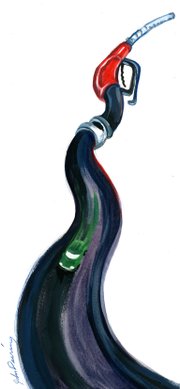GREEN BAY, Wis. -- The Trump administration's Environmental Protection Agency and Transportation Department are about to propose a significant weakening of vehicle fuel economy and emissions standards that will adversely affect almost all of us. We need to pay close attention.
After extensive consultation with key stakeholders in 2009 and 2011, the Obama administration set fuel economy standards that were to rise gradually to a fleet average of 54.5 mpg by 2025, or in real world terms to about 40 mpg, still an impressive gain.
The Trump administration's proposal is expected to halt progress with the standards for the 2020 model year. It would require no improvements after that even though they can be made without adverse impacts on the economy or safety. Environmental and public-health groups decry this action as a highly destructive regulatory rollback.
Should the proposal survive the comment period and what could be years of litigation, it will likely hurt U.S. automakers and parts suppliers, harm the economy, worsen air pollution and slow the nation's progress on reducing greenhouse gas emissions.
Experts always debate the fine points of regulatory costs and benefits. Their conclusions reflect varying assumptions
and values, and the questions they choose to address or ignore.
For example, what are the effects of higher emissions on public health? What is the likely impact on climate change, where vehicle emissions are a major contributor? How will the new rules affect global trade in vehicles at a time when nearly all automakers are trying to move rapidly toward less polluting designs, such as electrics and hybrids?
In response to such questions, Trump administration officials criticize the Obama-era standards as too costly and a burden on automakers. They also argue, without evidence, that fuel-efficient vehicles are less safe because they weigh less.
Supporters of the current standards say that consumers will save money in the long run by using less fuel, and that the rules will improve air quality and public health while reducing greenhouse gas emissions. Some add that more efficient U.S. vehicles will do much better in global sales.
Supporters offer the more persuasive argument; even the auto industry thought so when the standards were first developed. Automakers supported them in part because they recognized the value of such standards for consumers and the future of their industry.
The original agreements allowed 15 years to develop the technologies essential for meeting fuel economy goals, and great progress has been made, as is evident to anyone driving a newer vehicle.
Even California, with its strict emissions requirements, thought well of the new policy, as did labor and environmental groups.
The Trump administration now challenges these agreements and may even seek to eliminate California's right to set tougher standards, which about a dozen other states follow. The auto industry wisely favors a compromise with California to ensure one national standard.
There is disagreement within the administration on precisely what to do, yet the final proposal might well be damaging to the industry, its parts suppliers, and their workers.
The impact on consumers is negative as well. The Obama administration argued that people would pay a little more for their vehicles, but also save thousands of dollars over time, particularly if gas prices rise.
Independent economic analyses confirmed that keeping strong standards not only would save money, but also provide market certainty and push much-needed technological innovation.
The Trump administration argues that the standards do not benefit consumers and may even harm them. Yet its ideologically-driven analyses are suspect.
We can do much better. At the very least, any reassessment of fuel economy standards should be comprehensive and transparent, with objective consideration of the full range of their impacts. Anything less is a disservice to the nation.
Michael Kraft is professor emeritus of political science and public and environmental affairs at the University of Wisconsin-Green Bay.
Editorial on 08/12/2018
